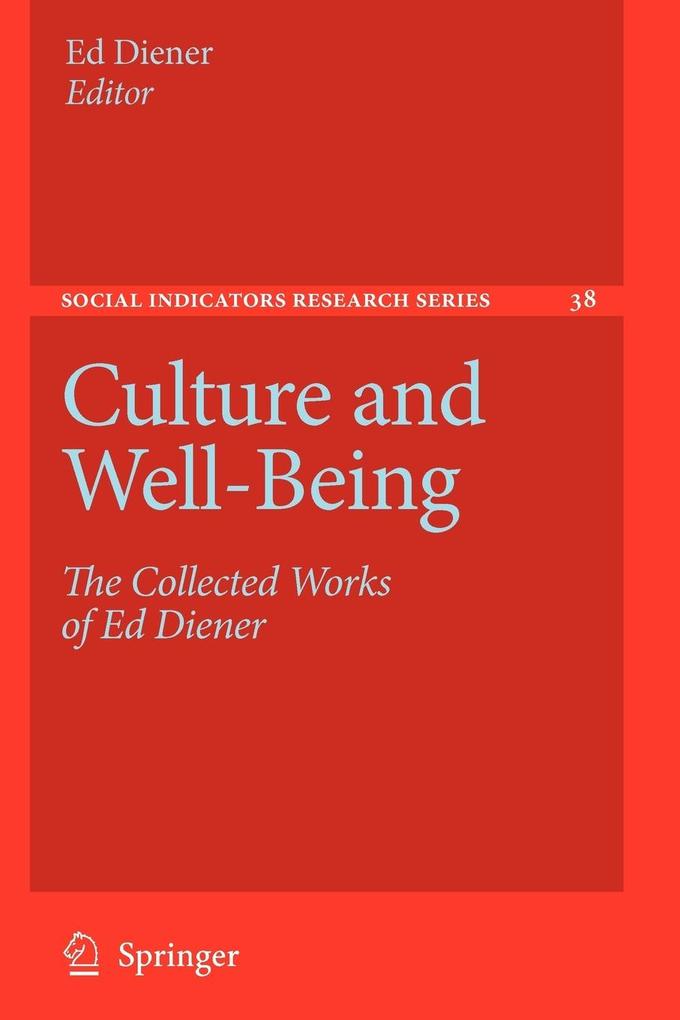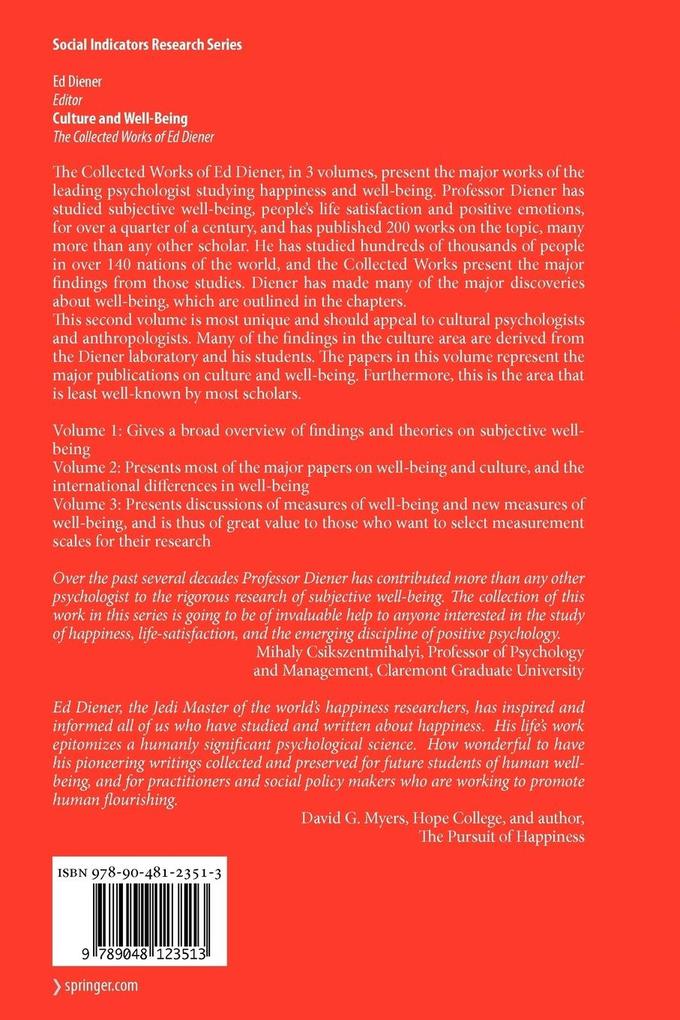
Zustellung: Di, 29.07. - Sa, 02.08.
Versand in 2 Wochen
VersandkostenfreiBestellen & in Filiale abholen:
Ed Diener is the leading research scientist studying happiness and well-being. This is the second of three volumes that collect all his major works. It covers well-being in and across various cultures and includes work from Diener's former students.
material boundaries capture cultural effects? The articles contained in this volume offer initial answers to most of these questions. The culture and well-being questions are of fundamental importance to understanding in the entire eld and to scienti c knowledge in the behavioral s- ences as a whole. Unless we understand what is universal and what is speci c, we cannot hope to understand the processes governing well-being. Unfortunately, our scienti c knowledge in most behavioral science elds, including the study of we- being, has been built on a narrow database drawn from westernized, industrialized nations. This means that we have only a little knowledge of whether our ndings are generalizable to all peoples of the globe and to universal human psychol- ical processes. Fortunately, during the last decade my students and I, as well as others working in this area, have rapidly expanded our knowledge of well-being vis-a-vis ` culture. The rst attempt to summarize the ndings in this area came in 1999 with Culture and Subjective Well-Being, a book edited by Eunkook Suh and Diener. The current volume represents a renewed effort to give a broad overview of major ndings in this area and to point to the important directions for future research. Composition of This Volume I am very pleased with the articles presented in this volume because I believe that they represent true advances in our fundamental understanding of subjective we- being.
Inhaltsverzeichnis
Culture and Well-Being Works by Ed Diener. - Culture and Subjective Well-Being. - Factors Predicting the Subjective Well-Being of Nations. - Cross-Cultural Correlates of Life Satisfaction and Self-Esteem. - Goals, Culture, and Subjective Well-Being. - Cross-Cultural Variations in Predictors of Life Satisfaction: Perspectives from Needs and Values. - From Culture to Priming Conditions: Self-Construal Influences on Life Satisfaction Judgments. - The Dynamics of Daily Events and Well-Being Across Cultures: When Less Is More. - Norms for Experiencing Emotions in Different Cultures: Inter- and Intranational Differences. - Emotions Across Cultures and Methods. - Positivity and the Construction of Life Satisfaction Judgments: Global Happiness is Not the Sum of its Parts. - Most People Are Pretty Happy, but There Is Cultural Variation: The Inughuit, the Amish, and the Maasai. - Making the Best of a Bad Situation: Satisfaction in the Slums of Calcutta. - Conclusion: What We Have Learned and Where We Go Next.
Produktdetails
Erscheinungsdatum
09. Juni 2009
Sprache
englisch
Auflage
2009 edition
Reihe
Social Indicators Research Series
Herausgegeben von
Ed Diener
Verlag/Hersteller
Produktart
kartoniert
Abbildungen
X, 290 p.
Gewicht
440 g
Größe (L/B/H)
234/158/20 mm
ISBN
9789048123513
Entdecken Sie mehr
Pressestimmen
From the reviews:
"Culture and Well-Being, covers national differences in life satisfaction and the role of cultural factors in producing these differences. ... I can envision its use in a college class concerned with culture and well-being. ... Certainly academic researchers interested in well-being will find them extremely useful. ... The audience should extend beyond research psychologists and include policy makers as well as interested members of the general public. ... the collected works of Ed Diener are timely, impressive, and useful." (Christopher Peterson, PsycCRITIQUES, Vol. 54 (50), 2009)
"Culture and Well-Being, covers national differences in life satisfaction and the role of cultural factors in producing these differences. ... I can envision its use in a college class concerned with culture and well-being. ... Certainly academic researchers interested in well-being will find them extremely useful. ... The audience should extend beyond research psychologists and include policy makers as well as interested members of the general public. ... the collected works of Ed Diener are timely, impressive, and useful." (Christopher Peterson, PsycCRITIQUES, Vol. 54 (50), 2009)
Bewertungen
0 Bewertungen
Es wurden noch keine Bewertungen abgegeben. Schreiben Sie die erste Bewertung zu "Culture and Well-Being" und helfen Sie damit anderen bei der Kaufentscheidung.










